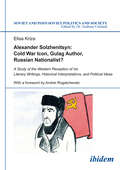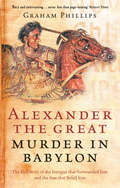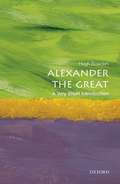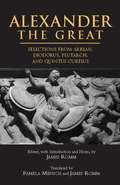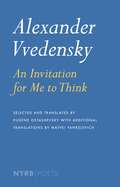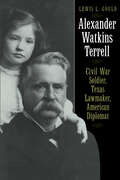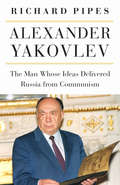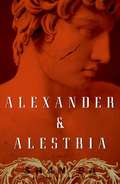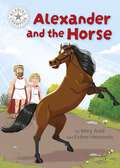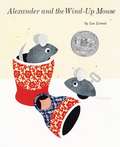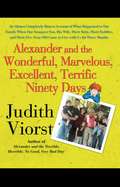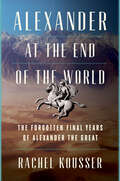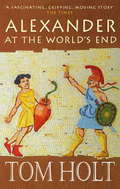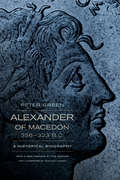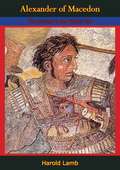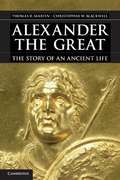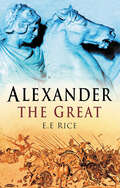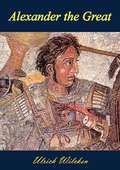- Table View
- List View
Alexander Solzhenitsyn: A Study of His Western Reception (Soviet and Post-Soviet Politics and Society #131)
by Elisa KrizaThis book offers an in-depth analysis of Alexander Solzhenitsyn's reception in the U.S., U.K., and Germany before and after 1991. Elisa Kriza explores his corpus through the paradigm of witness literature and confronts contentious subjects, such as antifeminism, anti-Semitism, and revisionism. Redefining Solzhenitsyn's work as memory culture, Kriza reveals the dynamics that transform a controversial figure into a moral icon.
Alexander Solzhenitsyn: Cold War Icon, Gulag Author, Russian Nationalist?
by Elisa KrizaAlexander Solzhenitsyn was one of the Cold War's most iconic writers. This book offers an in-depth analysis of his reception in the US, UK, and Germany before and after 1991. Elisa Kriza skillfully explores how Solzhenitsyn's work can be understood with the paradigm of witness literature and uncovers the dynamics behind the politicized reception of his writing. From the mid-1980s onwards, Solzhenitsyn's popularity dwindled--was this for ideological reasons? What about the rumors linking him with Russian nationalism? This study does not shy away from stretching beyond anti-communism and touching more contentious subjects--such as anti-feminism, anti-Semitism, and revisionism--in Solzhenitsyn's work and reception. Bringing Solzhenitsyn back from his 'critical exile' and redefining his work as memory culture, Kriza's book is a crucial scholarly intervention, unveiling the mechanism that can transform a controversial figure into a moral icon.
Alexander The Great
by Graham PhillipsMURDER IN BABYLON is a real-life historical detective story: a true tale of murder and mystery that has remained untold for over two thousand years.Recreating the scene of the crime to reveal eight suspects, each with the motive and opportunity to have assassinated the king. Graham Phillips uncovers a maze of intrigue, power-play and romantic tragedy that led inevitably towards Alexander's death. Ultimately, in a dramatic twist in the tale, the murderer is finally unveiled.
Alexander The Great: A Very Short Introduction
by Hugh BowdenAlexander the Great became king of Macedon in 336 BC, when he was only 20 years old, and died at the age of 32, twelve years later. During his reign he conquered the Achaemenid Persian Empire, the largest empire that had ever existed, leading his army from Greece to Pakistan, and from theLibyan desert to the steppes of Central Asia. His meteoric career, as leader of an alliance of Greek cities, Pharaoh of Egypt, and King of Persia, had a profound effect on the world he moved through. Even in his lifetime his achievements became legendary and in the centuries that followed his storywas told and retold throughout Europe and the East. Greek became the language of power in the Eastern Mediterranean and much of the Near East, as powerful Macedonian dynasts carved up Alexander's empire into kingdoms of their own, underlaying the flourishing Hellenistic civilization that emergedafter his death. But what do we really know about Alexander? In this Very Short Introduction, Hugh Bowden goes behind the usual historical accounts of Alexander's life and career. Instead, he focuses on the evidence from Alexander's own time - letters from officials in Afghanistan, Babylonian diaries, records fromEgyptian temples - to try and understand how Alexander appeared to those who encountered him. In doing so he also demonstrates the profound influence the legends of his life have had on our historical understanding and the controversy they continue to generate worldwide.
Alexander The Great: Selections from Arrian, Diodorus, Plutarch, and Quintus Curtius
by James Romm Pamela MenschComprising relevant selections from the four ancient writers whose portraits of Alexander the Great still survive--Arrian, Diodorus, Plutarch, and Quintus Curtius--this volume provides a complete narrative of the important events in Alexander's life. The Introduction sets these works in historical context, stretching from the conclusion of the Peloponnesian War through Alexander's conquest of Asia, and provides an assessment of Alexander's historical importance as well as a survey of the central controversies surrounding his personality, aims and intentions. This edition includes a timeline, maps, a bibliography, a glossary, and an index.
Alexander Vvedensky: An Invitation For Me To Think (NYRB Poets)
by Matvei Yankelevich Eugene Ostashevsky Alexander Vvedensky"Pussy Riot are Vvedensky's disciples and his heirs. Katya, Masha, and I are in jail but I don't consider that we've been defeated.... According to the official report, Alexander Vvedensky died on December 20, 1941. We don't know the cause, whether it was dysentery in the train after his arrest or a bullet from a guard. It was somewhere on the railway line between Voronezh and Kazan. His principle of 'bad rhythm' is our own. He wrote: 'It happens that two rhythms will come into your head, a good one and a bad one and I choose the bad one. It will be the right one.' ... It is believed that the OBERIU dissidents are dead, but they live on. They are persecuted but they do not die." -- Pussy Riot [Nadezhda Tolokonnikova's closing statement at their trial in August 2012] "I raise[d] my hand against concepts," wrote Alexander Vvedensky, "I enacted a poetic critique of reason." This weirdly and wonderfully philosophical poet was born in 1904, grew up in the midst of war and revolution, and reached his artistic maturity as Stalin was twisting the meaning of words in grotesque and lethal ways. Vvedensky--with Daniil Kharms the major figure in the short-lived underground avant-garde group OBERIU (a neologism for "the union for real art")--responded with a poetry that explodes stable meaning into shimmering streams of provocation and invention. A Vvedensky poem is like a crazy party full of theater, film, magic tricks, jugglery, and feasting. Curious characters appear and disappear, euphoria keeps company with despair, outrageous assertions lead to epic shouting matches, and perhaps it all breaks off with one lonely person singing a song. A Vvedensky poem doesn't make a statement. It is an event. Vvedensky's poetry was unpublishable during his lifetime--he made a living as a writer for children before dying under arrest in 1942--and he remains the least known of the great twentieth-century Russian poets. This is his first book to appear in English. The translations by Eugene Ostashevsky and Matvei Yankelevich, outstanding poets in their own right, are as astonishingly alert and alive as the originals.
Alexander Watkins Terrell: Civil War Soldier, Texas Lawmaker, American Diplomat (Focus on American History Series)
by Lewis L. GouldAlexander Terrell's career placed him at the center of some of the most pivotal events in nineteenth- and early twentieth-century history, ranging from the Civil War to Emperor Maximilian's reign over Mexico and an Armenian genocide under the Ottoman Empire. Alexander Watkins Terrell at last provides the first complete biographical portrait of this complex figure. Born in Virginia in 1827, Terrell moved to Texas in 1852, rising to the rank of Confederate brigadier general when the Civil War erupted. Afterwards, he briefly served in Maximilian's army before returning to Texas, where he was elected to four terms in the state Senate and three terms in the House. President Grover Cleveland appointed him minister to the Ottoman Empire, dispatching him to Turkey and the Middle East for four years while the issues surrounding the existence of Christians in a Muslim empire stoked violent confrontations there. His other accomplishments included writing legislation that created the Texas Railroad Commission and what became the Permanent University Fund (the cornerstone of the University of Texas's multibillion-dollar endowment). In this balanced exploration of Terrell's life, Gould also examines Terrell's views on race, the impact of the charges of cowardice in the Civil War that dogged him, and his spiritual searching beyond the established religions of his time. In his rich and varied life, Alexander Watkins Terrell experienced aspects of nineteenth-century Texas and American history whose effects have continued down to the present day.
Alexander Wilson: The Scot Who Founded American Ornithology
by Edward H. Burtt William E. Davis Jr.Audubon was not the father of American ornithology. That honorific belongs to Alexander Wilson, whose encyclopedic American Ornithology established a distinctive approach that emphasized the observation of live birds. In the first full-length study to reproduce all of Wilson's unpublished drawings for the nine-volume Ornithology, Edward Burtt and William Davis illustrate Wilson's pioneering and, today, underappreciated achievement as the first ornithologist to describe the birds of the North American wilderness. Abandoning early ambitions to become a poet in the mold of his countryman Robert Burns, Wilson emigrated from Scotland to settle near Philadelphia, where the botanist William Bartram encouraged his proclivity for art and natural history. Wilson traveled 12,000 miles on foot, on horseback, in a rowboat, and by stage and ship, establishing a network of observers along the way. He wrote hundreds of accounts of indigenous birds, discovered many new species, and sketched the behavior and ecology of each species he encountered. Drawing on their expertise in both science and art, Burtt and Davis show how Wilson defied eighteenth-century conventions of biological illustration by striving for realistic depiction of birds in their native habitats. He drew them in poses meant to facilitate identification, making his work the model for modern field guides and an inspiration for Audubon, Spencer Fullerton Baird, and other naturalists who followed. On the bicentennial of his death, this beautifully illustrated volume is a fitting tribute to Alexander Wilson and his unique contributions to ornithology, ecology, and the study of animal behavior.
Alexander Yakovlev: The Man Whose Ideas Delivered Russia from Communism (NIU Series in Slavic, East European, and Eurasian Studies)
by Richard PipesA significant political figure in twentieth-century Russia, Alexander Yakovlev was the intellectual force behind the processes of perestroika (reconstruction) and glasnost (openness) that liberated the Soviet Union and Eastern Europe from Communist rule between 1989 and 1991. Yet, until now, not a single full-scale biography has been devoted to him. In his study of the unsung hero, Richard Pipes seeks to rectify this lacuna and give Yakovlev his historical due. Yakovlev's life provides a unique instance of a leading figure in the Soviet government who evolved from a dedicated Communist and Stalinist into an equally ardent foe of everything the Leninist-Stalinist regime stood for. He quit government service in 1991 and lived until 2005, becoming toward the end of his life a classical western liberal who shared none of the traditional Russian values. Pipes's illuminating study consists of two parts: a biography of Yakovlev and Pipes's translation of two important articles by Yakovlev. It will appeal to specialists and students of Soviet and post-Soviet studies, government officials involved with foreign policy, and general readers interested in the history of Russia and the Soviet Union.
Alexander and Alestria
by Shan Sare-creating the lives of two of the most intriguing rulers in history, Shan Sa brings us a novel filled with the sound of hooves, the whistle of arrows, blood, passion, and betrayal. The familiar figure of Alexander the Great comes to new life in this richly imagined tale, which entwines his historical legacy with a fantastic love affair set in a wartime between Western and Eastern civilizations. Abused by his father, King Philip, who loved and hated his beauty; shadowed by his mother, the mystical and overbearing Queen Olympias; educated by Aristotle who wanted him to be a wise philosopher of Macedonia, Alexander develops a complex character. He becomes a brutal warrior, a pitiless strategist, and a poet longing for the world's wonders. Meanwhile, in the remote steppes of Siberia, an abandoned girl grows up among the wild mares, then adopted by the queen of the Amazons-the tribe of female warriors who dominates a wild world of snow and volcano. As a future queen, the young girl is trained to hate men and to fight against all invaders. In the course of his great conquest of Asia, Alexander first meets the stunning Alestria on the battlefield. Surprised to find that his adversary is a woman, he is instantly smitten by the fierce queen. Dazzled by his strength, she decides to kidnap him and make him her "wife." At last, this legendary king-renowned for his beauty and love of men-has found his equal. And at last, this indomitable young woman has found a reason to leave her tribe. Their love, deeply passionate and problematic, evolves against an exotic backdrop of warfare and political turmoil, sweeps from antique Greece to Egypt, across the ancient Iraq and Iran, unto the mysterious kingdoms of India.
Alexander and the Horse: Independent Reading White 10 (Reading Champion #517)
by Mary AuldThis story is part of Reading Champion, a series carefully linked to book bands to encourage independent reading skills, developed with Dr Sue Bodman and Glen Franklin of UCL Institute of Education (IOE) Fantastic, original stories are accompanied by engaging artwork and a reading activity. Each book has been carefully graded so that it can be matched to a child's reading ability, encouraging reading for pleasure. Perfect for 7-9-year-olds or those reading book band white.When Alexander the Great was just a boy, he met a horse that he longed to own. But the horse could not be ridden ...
Alexander and the Terrible, Horrible, No Good, Very Bad Day
by Judith Viorst Ray CruzAlexander knew it was going to be a terrible day when he woke up with gum in this hair. And it got worse... His best friend deserted him. There was no dessert in his lunch bag. And, on top of all that, there were lima beans for dinner and kissing on TV! Judith Viorst's classic picture book is sure to charm readers of all ages. Images and image descriptions available.
Alexander and the Wind-Up Mouse
by Leo LionniA Caldecott Honor Book. Alexander, the mouse, makes friends with Willy, a toy mouse, and wants to be just like him until he discovers that Willy is to be thrown away.
Alexander and the Wonderful, Marvelous, Excellent, Terrific Ninety Days: An Almost Completely Honest Account of What Happened to Our Family When Our Youngest Son, His Wife, Their Baby, Their Toddler, and Their Five-Year-Old Came to Live with Us for Three Months
by Judith ViorstWhatever became of Alexander after that famously bad day? And did you know that Judith Viorst is his mother? And what happens to her passion for household neatness and orderliness, her deep devotion to schedules, her compulsive yearning to offer helpful advice when Alexander -- now grown up, married, and the father of three -- moves his family into his parents' house? What happens is controlled, and sometimes not so controlled, chaos, as lives and routines are turned upside down and the house is overrun with scattered toys, pacifiers, baby bottles, sippy cups, pink-sequined flip-flops, jigsaw puzzles, and fishy crackers. With her characteristic sparkle and wit, Viorst relates her efforts to (graciously) share space, to become (if only a little bit) more flexible, to (sort of) keep her opinions to herself, and even to eventually figure out how to unlock the safety locks of the baby's (expletives deleted) bouncy seat. She describes how she and her husband, while sometimes longing for the former peace and tranquillity of unravished rooms and quiet dinners for two unaccompanied by cries of "Oh, yuck!" survived and relished the extended visit of the Alexander Five. She also opens our eyes to the joys of multigenerational family living and to the unexpected opportunities to grow that life presents -- even under the most unlikely circumstances. Several generations of readers surely will relate to this funny and loving book, enhanced throughout by Laura Gibson's delightful two-color drawings.
Alexander at the End of the World: The Forgotten Final Years of Alexander the Great
by Rachel Kousser“A heart-pounding, mind-bending adventure.” —Ilyon WooA riveting biography of Alexander the Great’s final years, when the leader’s insatiable desire to conquer the world set him off on an exhilarating, harrowing journey that would define his legacy. By 330 B.C.E., Alexander the Great had reached the pinnacle of success. Or so it seemed. He had defeated the Persian ruler Darius III and seized the capital city of Persepolis. His exhausted and traumatized soldiers were ready to return home to Macedonia. Yet Alexander had other plans. He was determined to continue heading east to Afghanistan in search of his ultimate goal: to reach the end of the world. Alexander’s unrelenting desire to press on resulted in a perilous seven-year journey through the unknown eastern borderlands of the Persian empire that would test the great conqueror’s physical and mental limits. He faced challenges from the natural world, moving through deadly monsoons and extreme temperatures; from a rotating cast of well-matched adversaries, who conspired against him at every turn; and even from his own men, who questioned his motives and distrusted the very beliefs on which Alexander built his empire. This incredible sweep of time, culminating with his death in 323 BC at the age of 32, would come to determine Alexander’s legacy and shape the empire he left behind. In Alexander at the End of the World, renowned classicist and art history professor Rachel Kousser vividly brings to life Alexander’s labyrinthine, treacherous final years, weaving together a brilliant series of epic battles, stunning landscapes, and nearly insurmountable obstacles. Meticulously researched and grippingly written, Kousser’s narrative is an unforgettable tale of daring and adventure, an inspiring portrait of grit and ambition, and a powerful meditation on the ability to learn from failure.
Alexander at the World's End
by Tom HoltWhen his father dies, and he is reduced at a stroke from prosperity to penury, Euxenus decides to leave Athens and seek his fortune elsewhere. As a philosopher and intellectual of some note, he has no difficulty getting a job as tutor to a young prince in the wealthy but utterly provincial court of King Philip of Macedon. The young prince is called Alexander, and the rest is history. Or is it? Alexander conquered Greece, Egypt and the Persian Empire in the course of eight years, amassing a huge army along the way, and leaving behind him the foundations of countless new cities named after him. He proclaimed himself a deity, and died at the age of 33. In ALEXANDER AT THE WORLD'S END, Tom Holt tells the story of two remarkable men, one of whom conquered empires and one of whom struggled to overcome the drainage problems of a small village. It is a story of two men whose paths crossed only briefly, but whose encounter changed both their lives for ever. And it is a story which throws an extraordinary new light on the man who became Alexander the Great.
Alexander of Macedon, 356-323 B.C.: A Historical Biography
by Peter GreenUntil recently, popular biographers and most scholars viewed Alexander the Great as a genius with a plan, a romantic figure pursuing his vision of a united world. His dream was at times characterized as a benevolent interest in the brotherhood of man, sometimes as a brute interest in the exercise of power. Green, a Cambridge-trained classicist who is also a novelist, portrays Alexander as both a complex personality and a single-minded general, a man capable of such diverse expediencies as patricide or the massacre of civilians. Green describes his Alexander as "not only the most brilliant (and ambitious) field commander in history, but also supremely indifferent to all those administrative excellences and idealistic yearnings foisted upon him by later generations, especially those who found the conqueror, tout court, a little hard upon their liberal sensibilities." This biography begins not with one of the universally known incidents of Alexander's life, but with an account of his father, Philip of Macedonia, whose many-territoried empire was the first on the continent of Europe to have an effectively centralized government and military. What Philip and Macedonia had to offer, Alexander made his own, but Philip and Macedonia also made Alexander form an important context for understanding Alexander himself. Yet his origins and training do not fully explain the man. After he was named hegemon of the Hellenic League, many philosophers came to congratulate Alexander, but one was conspicuous by his absence: Diogenes the Cynic, an ascetic who lived in a clay tub. Piqued and curious, Alexander himself visited the philosopher, who, when asked if there was anything Alexander could do for him, made the famous reply, "Don't stand between me and the sun." Alexander's courtiers jeered, but Alexander silenced them: "If I were not Alexander, I would be Diogenes." This remark was as unexpected in Alexander as it would be in a modern leader. For the general reader, the book, redolent with gritty details and fully aware of Alexander's darker side, offers a gripping tale of Alexander's career. Full backnotes, fourteen maps, and chronological and genealogical tables serve readers with more specialized interests.
Alexander of Macedon, 356–323 B.C.
by Peter GreenUntil recently, popular biographers and most scholars viewed Alexander the Great as a genius with a plan, a romantic figure pursuing his vision of a united world. His dream was at times characterized as a benevolent interest in the brotherhood of man, sometimes as a brute interest in the exercise of power. Green, a Cambridge-trained classicist who is also a novelist, portrays Alexander as both a complex personality and a single-minded general, a man capable of such diverse expediencies as patricide or the massacre of civilians. Green describes his Alexander as "not only the most brilliant (and ambitious) field commander in history, but also supremely indifferent to all those administrative excellences and idealistic yearnings foisted upon him by later generations, especially those who found the conqueror, tout court, a little hard upon their liberal sensibilities."This biography begins not with one of the universally known incidents of Alexander's life, but with an account of his father, Philip of Macedonia, whose many-territoried empire was the first on the continent of Europe to have an effectively centralized government and military. What Philip and Macedonia had to offer, Alexander made his own, but Philip and Macedonia also made Alexander form an important context for understanding Alexander himself. Yet his origins and training do not fully explain the man. After he was named hegemon of the Hellenic League, many philosophers came to congratulate Alexander, but one was conspicuous by his absence: Diogenes the Cynic, an ascetic who lived in a clay tub. Piqued and curious, Alexander himself visited the philosopher, who, when asked if there was anything Alexander could do for him, made the famous reply, "Don't stand between me and the sun." Alexander's courtiers jeered, but Alexander silenced them: "If I were not Alexander, I would be Diogenes." This remark was as unexpected in Alexander as it would be in a modern leader.For the general reader, the book, redolent with gritty details and fully aware of Alexander's darker side, offers a gripping tale of Alexander's career. Full backnotes, fourteen maps, and chronological and genealogical tables serve readers with more specialized interests.
Alexander of Macedon: The Journey to the World’s End
by Harold LambTHE STORY OF THE GREATEST MILITARY GENIUS OF ALL TIME—ALEXANDER THE GREATFrom the dark forests of barbarian Europe, across the illimitable steppes of Asia, into the cities of golden India—Alexander led his invincible Macedonians to conquer the world.Harold Lamb, the superb historian-storyteller—whose brilliant Genghis Khan, Suleiman the Magnificent and Tamerlane have been read by millions—brings to pulsing life the story of a man who towered above his age, conquered the world, and forever changed the tide of human destiny.
Alexander the Avoider
by Nicole FilipponeWINNER of the International Communicator Award for Best Storytelling Podcast and the Davey Award for best inclusive podcast! Imagination Storybooks makes illustrated children's books accessible to blind and ALL children by adding rich audio description (AD) of the pictures.
Alexander the Glorious
by Jane OliverIn ALEXANDER THE GLORIOUS, Jane Oliver takes as her subject that thirteenth-century Alexander who brought a golden age of order to the chaos and violence that marked medieval Scotland. His story is that of the evolution of a frightened and lonely boy into a wise and just ruler. Crowned king when he was only seven, forced into a marriage with Margaret--daughter of Henry III of England--while they were still children, and considered by his elders as little more than a pawn in their own quest for power, he successfully resisted the intrigues of both his father-in-law and his lords to usurp his prerogatives. As social and military leader of his people, he raised them to great heights and found his reward in the satisfaction of seeing his child bride grow into a loving, and beloved, wife and mother. But if his middle years were full of joy, his later years were doomed to personal tragedy. Just when he should have been able to enjoy the fruits of his labors, he was forced into an ill-fated second marriage in order to provide a new heir to the throne. Only in the light of this period, during which Edward I of England was already casting a covetous eye upon Scotland, can the long years of darkness that would overtake Alexander's people upon his death be properly understood, years that would see his nation placed under an English rule that would not end until the emergence of Wallace and Bruce.
Alexander the Grape and Other Fruit and Vegetable Jokes
by Charles KellerFun food and vegetable jokes for kids of all ages, and older readers. This involves many different kinds of entertainment for family and friends. Enjoy! "Why aren't bananas ever lonely? Because they come in bunches. What is the best way to keep dried prunes? Don't return them."
Alexander the Great
by Christopher W. Blackwell Thomas R. MartinEverything we know about Alexander comes from ancient sources, which agree unanimously that he was extraordinary and greater than everyday mortals. From his birth into a hypercompetitive world of royal women through his training under the eyes and fists of stern soldiers and the piercing intellect of Aristotle; through friendships, rivalries, conquests and negotiations; through acts of generosity and acts of murder, this book explains who Alexander was, what motivated him, where he succeeded (in his own eyes) and where he failed, and how he believed that he earned a new 'mixed' nature combining the human and the divine. This book explains what made Alexander 'Great' according to the people and expectations of his time and place and rejects modern judgments asserted on the basis of an implicit moral superiority to antiquity.
Alexander the Great
by E E RiceKing Alexander III 'the Great' of Macedon was one of the greatest military commanders the world has ever known. This book seeks to dispel some of the myths which have grown up around him and to provide an up-to-date account of his life. This includes the Macedonian background and Alexander's early years, his campaigns in Thrace and Illyria and the destruction of Thebes, the invasion of the Persian Empire and the battles which led to its conquest, his expeditions to India and finally his death in Babylon. Dr Rice also assesses Alexander's personality, and provides a summary of his legacy to the western world.
Alexander the Great
by Ulrich Wilcken G. C. Richards"ALEXANDER THE GREAT opened a new era in the history of the world, and by his life's work determined its development for many centuries. He is conspicuous among the great men of history, because this work was accomplished in so short a span; when he died, he had not yet reached his thirty-third year. It was as a great conqueror that he impressed the popular imagination of every race. He subdued the East and penetrated into India, that land of wonders. The legend about him, equally current in East and West, took him to the limits of the earth and even to the gates of Paradise. The permanent result of his life, however, was not the empire which he won by hard fighting, but the development of Greek civilisation into a civilisation which was worldwide. It is in this way that his influence has affected the history of mankind even down to our own time. He had first to create his empire; the decision of the battlefield had, as usual, to produce the external conditions for the new civilisation."Originally published in 1932, Ulrich Wilcken's distinguished biography of Alexander the Great is widely regarded as a classic, perfectly capturing Alexander's true achievements and influence.Translated from German by G. C. Richards, Professor of Greek and Classical Literature at Oriel College, Oxford University.
